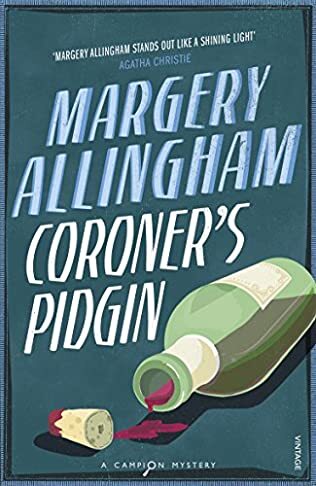Coroner’s Pidgin

A review if Coroner’s Pidgin by Margery Allingham
It must be very disconcerting to come back home after three years’ service overseas and find the body of a dead woman whom you do not recognise in your bed. This is what happens to Allingham’s sleuth, Albert Campion, at the start of this, his twelfth adventure, originally published in 1945 and which goes by the alternative title, Pearls before Swine in the States. All Campion wants to do is have a bath, change his clothes and catch a train to Nidd for reasons which are revealed in a touching, if somewhat sentimental, finale which must resonated with many of Allingham’s contemporary readers. Instead, Campion is drawn unwillingly into a mystery which involves traitors and the theft of the nation’s precious artefacts.
There is a very modern feel to the book as it can be read as a meditation on whether certain people are above the law simply because of who they are. Lady Carados, who has moved the body from her son’s flat with the assistance of the wonderful Magersfontein Lugg, who has gone all Lord Emsworth-like, is portrayed as a force of nature who believes she has the right to do whatever she wants and is oblivious to the requirements of the police or the fact that her actions are only serving to incriminate her. Johnny, her son, also seems to be above the law. When he inadvertently poisons an old friend, his friends are more concerned about protecting him than the fact that he may have committed attempted manslaughter. Our Prime Minister – this review was written in mid-May – is just the latest in a long line of such people.
Campion’s role in this story is rather ancillary to the plot rather than one that drives it forward. He has the unerring knack of being in the right (or wrong, depending on your perspective) place at the right time, is fed information, overhears conversations, is able to put two and two together, but it is the police, principally his old mucker Stanislaus Oates assisted by Holly and Yeo, who put in the leg work to solve the mystery.
Characters drift in and out of the story, there are twists and turns in the plot lines, some red herrings, some cases of a rare wine, and an American GI who, unwittingly, is key to the unravelling of the plot to rob the nation of its prize treasures. The start of the war had seen the mass evacuation of treasures from London and other likely targets for German air raids but the hauliers, under the direction of a shadowy eminence grise, are not necessarily working in the nation’s best interests. All roads seem to lead to one of the characters in society’s gilded cage, but the rare wine convinces Campion otherwise.
Allingham is a superb writer, setting the scene and sketching her characters with aplomb, and maximising the opportunities for humour that her scenes offer. I particularly enjoyed her portrayal of Campion trying to come to terms with the altered state of London, the wrecked buildings, the damaged roads, making it all very disorientating and difficult to move around the capital. Campion’s experience must have been familiar to her contemporary readers, many of whom had to make major adjustments to their lives and recognise that their old comfortable, familiar world was a thing of the past.
It is not a complicated plot, by the standards of the Golden Age, and the culprit is, with a bit of thought, relatively easy to spot, but it is a thoroughly good read, one that I would highly recommend.



